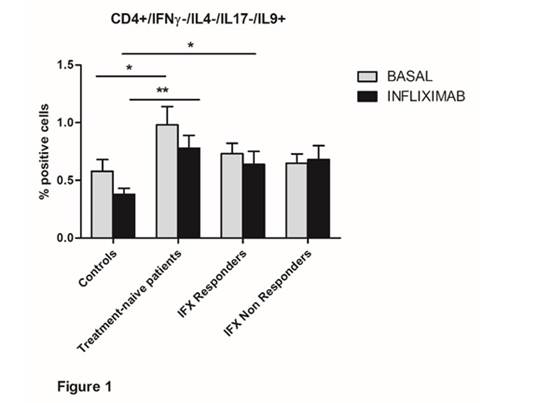Session Information
Title: Rheumatoid Arthritis - Clinical Aspects: Novel Biomarkers and Other Measurements of Disease Activity
Session Type: Abstract Submissions (ACR)
Background/Purpose Th9 cells are IL-9-secreting Th lymphocytes that are involved in the immunological responses underlying parasitic infections and allergic diseases. In the case of autoimmune diseases, Th9 cells seem to be involved in the pathogenesis of experimental autoimmune encephalomyelitis. No study has yet evaluated the effects of Th9 responses in rheumatic diseases such as rheumatoid arthritis (RA). The aim of this study was determine the prevalence of Th9 lymphocytes in RA patients and identify their possible association with the discontinuation of biological treatment with infliximab (IFX).
Methods We enrolled 55 consecutive RA outpatients: 15 not receiving any immunosuppressive drug; 20 responders to IFX treatment; and 20 who had discontinued IFX because of adverse events or inefficacy and were being treated with other biological agents (ABA, TCZ, ETN or CTZ) and traditional immunosuppressive drugs. The matched control group consisted of 10 healthy subjects. After giving their informed consent, the subjects underwent blood sampling for the isolation of peripheral blood mononuclear cells (PBMCs). The PBMCs were cultured with/without IFX 50 ƒÝg/L for 18 hours, and the percentage of Th9 cells was assessed by means of flow cytometry. Th9 lymphocytes were identified as IFNγ-, IL4-, IL17- , IL9-secreting CD4+ T cells.
Results Cytometric analysis revealed no significant decrease in the percentage of Th9 cells after IFX exposure in any of the groups, but there were significantly fewer cells in the healthy controls than the RA patients both before and after the IFX stimulation assay (Fig.1). The higher frequency of Th9 cells in the patients was not associated with higher levels of anti-nucleus autoantibodies or other auto-antibody subsets, or with a higher likelihood of experiencing an adverse event or lack of efficacy on IFX treatment.
Conclusion IL-9 levels are increased in RA patients, in whom it plays a crucial role. Th9 cells are the major producers of IL-9, and their prevalence is higher in RA patients than in healthy subjects, although they do not seem to affect the outcome of biological therapies.
Figure 1. The percentage of IFNγ-, IL4-, IL17-, IL9-secreting CD4+ T cells in RA patients and healthy controls under unstimulated and IFX-stimulated conditions. Mean values ±SE. *p <0.05; **p <0.01 (Student's t test)
Disclosure:
R. Talotta,
None;
A. Berzi,
None;
F. Atzeni,
None;
D. Dell’Acqua,
None;
P. Sarzi-Puttini,
None;
D. Trabattoni,
None.
« Back to 2014 ACR/ARHP Annual Meeting
ACR Meeting Abstracts - https://acrabstracts.org/abstract/th9-lymphocytes-in-rheumatoid-arthritis/

